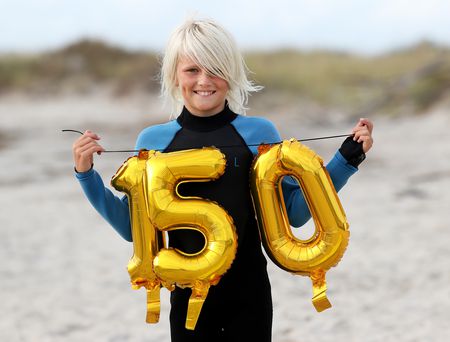In January of 2017, while on a surf trip in Central America, I received a piece of news that completely derailed my life.
It was a typically beautiful day in Santa Catalina, a popular surf town located on Pacific coast of the Panama. It was sunny, hot and humid, and there was a playful swell in the water. But instead of looking for perfect, uncrowded waves like I had come here to do, I sat on a bar stool inside the hostel I was staying at, feeling distressed, worried and shaken to my core. President Trump had just announced his infamous travel ban—or Executive Order 13769—which placed strict limits on travel to the United States by anyone from the countries of Iran, Libya, Syria, Yemen, Somalia, North Korea and Venezuela. Which included myself, an Iranian citizen.
I was born and raised in the landlocked city of Tehran, but had moved to Vancouver, Canada back in 2006 to pursue a western education and to “search for new air,” as we say in Farsi/Persian. I studied, worked and eventually married a Canadian.
As an Iranian national living in Canada, every time I wanted to enter the U.S., I had to apply for a single-entry, one-time use visa. The visa process was lengthy, but fairly straightforward and included an in-person interview at the embassy. Throughout the years, I visited the U.S. multiple times to visit my in-laws in Arizona, attend my best friend’s bachelorette party and explore New York. But due to the tedious visa process, there were also many events I missed: weddings, anniversaries, group vacations. Last-minute, spontaneous road trips were never an option for me.
Over time, I accustomed myself to the stringent visa requirements, extra questioning at the border and border guards sighing at the sight of my passport. I always knew that would be part of my reality in the world outside Iran–it comes with the territory–so I tried to take it lightly, offering up my immigration saga for laughs at parties.
But as I sat at the hostel bar in Panama that day in 2017, I realized traveling to the States was no longer a matter of going through the motions of a lengthy visa process. It was no longer an option for me at all. Before Donald Trump was elected president, my husband got a job with a tech company in San Francisco that offered to sponsor our visas, which would allow us both to work in the US. We sold our stuff. I quit my engineering job in Vancouver, and we had planned to travel a bit before settling down in California. Now, I had no idea what our next move would be.
All at once I was banned from entering the United States, period. Canadian permanent resident or not, I could no longer move to San Francisco, nor even visit my friends and family based in the States.
The announcement was sudden and left many people around the world feeling confused and unmoored. I phoned my husband who was away on a work trip, perplexed and worried, telling him how I thought this would impact our plans. After spending hours looking into how the travel ban was going to be implemented, I emerged hopeless, shaken and sad.
Behind the bar was the hostel’s owner, Noriel, a middle-aged man with bushy eyebrows and round, sympathetic eyes, radiating warmth like two slow-burning candles. Seeing the distress on my face, he suggested I go do what has always helped him during times of trouble.
“Grab a board, Sara, and get into the water,” he said.
I looked up at him and grumbled, explaining that I wasn’t exactly in the mood for a surf. It felt wholly unfair to wake up one day and find my life plans shaken, laid on the unstable foundation of a changing political climate.
Noriel and his family had endured tremendous suffering during the 1989 coup in Panama. Surfing, he told me, had always provided a refuge for him during tough times and insisted that the ocean would help me as well. Of course, he was right. Although I was fairly new to surfing, the act of paddling out into the lineup each day would help me in ways I never imagined.
I had learned to surf in Nicaragua, just 2 months before I arrived in Panama. Surfing had always looked so unreachable to me, especially coming from Tehran, where the only body of water I was familiar with was the swimming pool where I had learned to swim as a child. In fact, I was terrified of the ocean. I had never swum in open water and the whole ordeal was intense–fighting currents, taking waves on the head, desperately gulping for air. It was intimidating and physically exhausting. It was also a test of my stubbornness.
Eventually I learned to paddle properly. The ocean’s mercurial nature became less unpredictable, the wipeouts less brutal, and soon, I was hooked.
In lieu of settling down in San Francisco as planned, my husband and I headed to Mexico, one of the few countries I can enter using my Canadian work permit. My husband’s company, meanwhile, allowed him to work remotely while my visa issues were sorted. We ended up in Puerto Escondido, home to the heaviest beach break in the world. We had no idea what kind of waves were awaiting us, but we were determined to conquer both the surf and the setback of the travel ban.
I learned there are exceptions to the travel ban. After reviewing my case with immigration lawyers based in the States, we determined that I qualify for a “travel ban waiver”. So, armed with all the necessary forms, supplementary documents and a waiver application, I attended my visa interview at the U.S. consulate in Vancouver in March of 2018. Since then, we have been waiting for approval. I recently read that the waiver process is a bureaucratic mess, and I believe it. Every time I make contact with the consulate, their answer is the same: “you will have to wait.” At times I picture my waiver application on the bottom of a pile of papers on a desk at the consulate, gathering dust.
During the two and a half years we lived in Puerto, I continued to take Noriel’s advice. Every day, in waves big and small, I grabbed my board and paddled out. The ocean became my sanctuary, a hideout from the reality of being in perpetual limbo. Surfing gave me an escape from bad news, a physically and mentally demanding activity that eased my mind after every non-committal, emotionally draining response I got from the embassy. While my future in the U.S. remained out of my control, I found peace in the waves fronting our town.
The water in Puerto was warm almost all year. The sunsets had a soft, comforting orange glow to them, like someone struck a match across the horizon. On rainy days, the surface of an approaching wave looked like a bed sheet on a drying line, waving lightly in the wind. When rainy season arrived, during a heavy downpour, the border between the sky and the ocean disappeared and reading the waves became difficult. Locals told me to listen to them, but it took a while for me to train my ear.
In the summer of 2018, on a balmy June afternoon, I discovered the US Supreme Court decided in favor of the travel ban. Devastated, I didn’t know to whom I could write, to whom I could explain my immigration saga, or from where I could get some sort of answer on how much longer the administrative processing would take. I grabbed my board and walked to the beach. Careful not to let out tears, I paddled out, positioned myself just wide of the lineup and thought about all the other people who must be also devastated by the Supreme Court decision. How many people have priority over me? I thought, How many people are ahead of me, waiting in a different sort of lineup that we didn’t choose to wait in? Whose family is being separated as I wait for my turn to catch a wave?
Surfing helped me focus on the present, and to forget my immigration troubles, if only for a moment. During big wipeouts, immigration lines disappeared and the travel ban became non-existent. Instead, I focused on making it to the surface and taking my next breath.
My husband and I have recently moved back to Canada and, yes, I am still waiting for my visa. The embassy still tells me that they have no control over the administrative processing and that I must continue to wait. Meanwhile, I read reports that the waiver process is not being implemented at all and that Trump is further tightening visa requirements. These are the days that I feel most hopeless, voiceless and forgotten.
Back when I learned how to surf in Nicaragua, when life was smooth and all roads were leading to San Francisco, my goal was to stand up on a few waves. I didn’t realize then what I know now: that one day the ocean would become my safe space, a never-ending game of catching the last one before heading home, wherever that may be. Perhaps the last place people would expect to find an Iranian girl was in a small Mexican town, waiting patiently in the lineup for her turn to ride a wave, for a fleeting few seconds of joy.
I often think about Noriel that first day I heard about the travel ban. I picture him ordering me to grab my board and paddle out, me begrudgingly following his advice. At times while I wait my turn–for both my next wave and to gain entrance in the United States–I let my fear get the best of me. But when my opportunity does come, I’m going to grab it. And I’ll ride it all the way.






Recent Comments